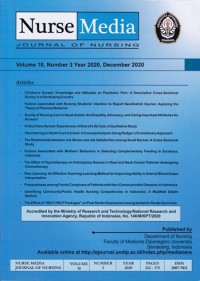
Jurnal
The Relationship between Job Stress and Job Satisfaction among Saudi Nurses: A Cross-Sectional Study
Background: The productivity of nurses and patient healthcare is highly influenced by nurses’ stress-related factors and job satisfaction. Nursing is the least preferred career opportunities for Saudi residents as compared to other options. Nurses’ perceptions of intention to quit contributes to their shortage in Saudi health care institutions.
Purpose: The study aimed to examine the relationship between work-related stress and job satisfaction among Saudi nurses working at a public hospital.
Methods: The research used a cross-sectional design that collected data from samples of 297 nurses working at a specified public hospital and aged over than 20 years old. Convenient sampling was employed to recruit the samples. Data were collected using the Expanded Nursing Stress Scale (ENSS) and Job Satisfaction Scale (JSS). The Statistical Package for Social Sciences (SPSS) version 20.0 was applied, and Pearson’s correlation test was to identify the relationship between variables.
Results: The results indicated that the nurses at the hospital where the study took place experienced low levels of stress with a mean value of 2.1995. Besides, the nature of work indicated maximum job satisfaction with a mean value of 15.666, whereas minimum job satisfaction levels (11.569), were related to benefits provided to nurses. A positive correlation was found between the level of stress and satisfaction with a p-value of 0.041.
Conclusion: The stress factors were highly correlated with job satisfaction. The identification of stress factors is important as it may create a negative impact on patients’ care and their well-being. It is suggested that changes in managerial affairs and policies are essential for implementing beneficial strategies that may assist in resolving the issue.
Availability
No copy data
Detail Information
- Series Title
-
Nurse Media Journal of Nursing, Vol. 10 No. 3 December 2020
- Call Number
-
(05) 610.5 DEP n
- Publisher
- Semarang : Department of Nursing, Faculty of Medicine Diponegoro University., 2020
- Collation
-
Hlm. 292-305
- Language
-
English
- ISBN/ISSN
-
2087-7811
- Classification
-
(05) 610.5 DEP n
- Content Type
-
-
- Media Type
-
-
- Carrier Type
-
-
- Edition
-
Vol. 10 No. 3 December 2020
- Subject(s)
- Specific Detail Info
-
-
- Statement of Responsibility
-
-
Other version/related
No other version available
File Attachment
Comments
You must be logged in to post a comment
 Computer Science, Information & General Works
Computer Science, Information & General Works  Philosophy & Psychology
Philosophy & Psychology  Religion
Religion  Social Sciences
Social Sciences  Language
Language  Pure Science
Pure Science  Applied Sciences
Applied Sciences  Art & Recreation
Art & Recreation  Literature
Literature  History & Geography
History & Geography